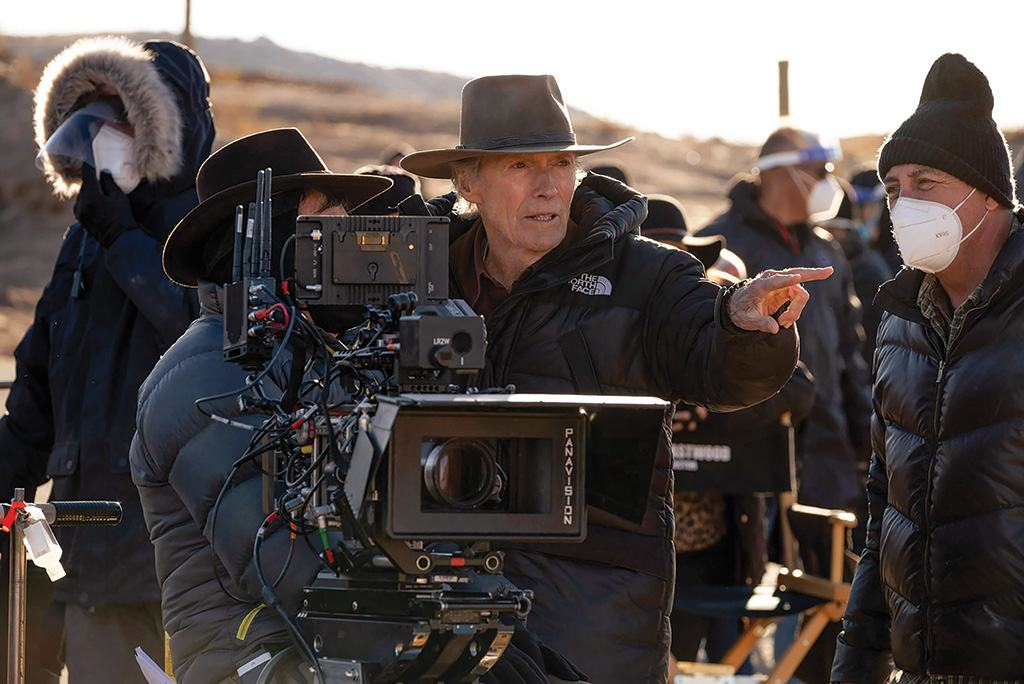Clint Eastwood, a longtime friend of Sun Valley Magazine, is not the sort of man you would immediately think of as emotional. It has been eight years since we last spoke to Eastwood, when that famous stare—part invitation and part threat—gazed out at us from the cover of the Summer 2013 issue. That stare is legendary, helping to cement his position as an enduring cultural icon of masculinity and machismo.
And yet, sitting down this past November to speak with the man whose character Dirty Harry delivered one simple line—spoken in a gravelly voice with the same intensity of gaze, “You’ve gotta ask yourself one question: ‘Do I feel lucky?’ Well, do ya, punk?”—reveals instead a man who is candid and thoughtful, forthcoming and accessible, almost too modest and maybe a bit contemplative.
After more than 66 years in the business and over 96 major award nominations and a staggering number of wins—from the Academy Awards, BAFTA Awards and Golden Globes, among others—Eastwood has earned the right to be reflective. He has earned the right to speak about the art of acting and filmmaking in any damn way he likes. And that’s exactly what he does—and some of it might be unexpected.
Time changes things and perhaps the mystique of Clint Eastwood, the actor, has become so intertwined with his iconic characters that expectations presume that, in person, he is actually more like the Preacher from Pale Rider (which was filmed in the Boulder Mountains in 1985, just north of his home in Sun Valley). Eastwood rose to fame and notoriety by playing tough men of few words accustomed to violence—which is why it comes as a bit of surprise, initially, when he speaks of the emotional craft of filmmaking.

Eastwood on the set of “Cry Macho” (2021), as director, producer and actor
“It’s not an intellectual art form; it’s an emotional art form,” Eastwood says. “If you start intellectualizing, sometimes you can think about it too much to the point where you lose the feeling of it.”
When considering what he wants to leave audiences with when the credits roll, Eastwood contemplates the importance of following instincts and listening to intuition. “You go through many more scripts than you really make, but then every once in a while, you get one and you think you like the characters, you like the drama, and you’ll kind of go for it,” says Eastwood. “So, it’s all instinctive. You kind of have to do what you feel like at the time and hope you’re lucky enough to do it well.”
Running on instinct has certainly worked for Eastwood, who has contributed to more than 50 feature films over his career—as actor, director, producer, and composer. His work has met with staggering commercial success, and he is one of only two people to have been nominated twice for Best Actor and Best Director for the same film (Unforgiven and Million Dollar Baby). Both films won four Academy Awards, with Eastwood winning Best Director and Best Picture, as well as receiving nominations for Best Actor, making him one of just a handful of directors best known as an actor to win the Academy Award for directing. And he did it twice. He has also directed five actors in Academy Award-winning performances in his films Unforgiven, Mystic River, and Million Dollar Baby.
It would be safe to say that Eastwood knows a good story when he sees it. It doesn’t always happen right away and sometimes the timing isn’t right, but Eastwood says he envisions the movie—and the characters in it—long before he makes it.
“You see the movie, and you see it being a movie in your mind,” Eastwood says. “And then you go ahead and make it. And sometimes it comes out okay, and sometimes not. But basically, you like the project, you like what it stands for, with the various feelings it carries, right when you first read it.”
That doesn’t mean you always have the perfect script, he reflects. Or even the perfect plot. Sometimes it takes numerous rewrites and revisions, and Eastwood asserts that even with all that work, there is no guarantee that the movie will be a success. “You make the film and then it’s given out to the audience,” Eastwood says, “and it’s up to the audience to say whether it’s any good or not from their perspective.”
“The most challenging thing is to try to visualize everything and know it when you see it,” he continues, “You have to do it in your mind first before you can put it out for other people to look at it. If you don’t really see it right away, you have to see it at some point in the process, because otherwise you’re just going down a blind alley.”
Eastwood uses his revisionist Western Unforgiven (1992) as an example of a project where the timing was off initially. He couldn’t see it in his mind when he first read the script. “I held onto that for 10 years before making it,” says Eastwood. “I read the script and liked it a lot, but at that time, I had done some other things of that nature, so I just decided to sit on it, and I actually forgot about it for a while. And then one day I said, ‘I’m going to revisit that.’ I don’t know what the reasoning was. But 10 years later, I took it out of the drawer and looked at it and said, ‘I’ve got to make this. This is pretty good.’”
Unforgiven was nominated for more than 19 major awards, winning four Academy Awards, including Best Picture, Best Director, Best Supporting Actor, and Best Film Editing, one BAFTA and two Golden Globes. Clearly, the timing was right.
Eastwood, always modest and honest about his projects, doesn’t seem overly concerned with the critics but clearly revels in the joy of his audience successes. He recognizes that, despite going with your gut, luck has something to do with it. “You have to believe the story would be interesting for you. But you’re just guessing because you don’t know if it would be interesting until you make it,” Eastwood says, “and then you don’t know that it will be interesting until people decide to go see it. So, it’s kind of a guessing game all the way around.”
And this seems to be what keeps Clint Eastwood working at the age of 91. “The ultimate joy is when people want to see your film, but it’s fun to make it,” he asserts. “They’re all little adventures.”
The adventure continued this past fall with Eastwood’s newest release Cry Macho (September 2021) from Warner Bros.—a story of being lost… and found. The plot tells the tale of a former rodeo star (Eastwood) who is fed up with macho posturing and is dealing with age and the possibility of change. Eastwood directed, produced, and acted the lead in the film, which are the same positions he held in his 2018 Warner Bros. release The Mule—proving that Clint Eastwood is not slowing down.
He still has stories to tell. And audiences are thankful for it.


